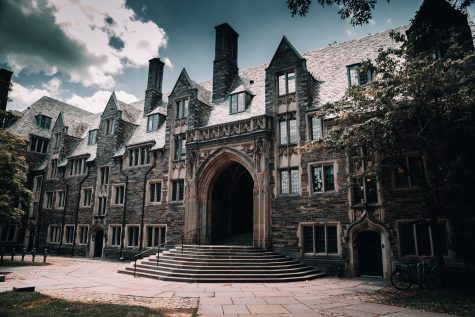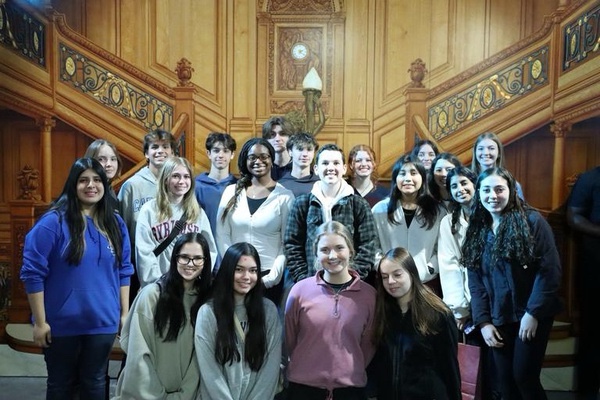A.P. Classes at Tuscarora: Are They Worth It? What Do Students Need to Know?
A dive into the benefits and pitfalls of A.P. classes with the opinions of five Tuscarora teachers.

By Carlin Lacques
Many students, of varying levels of academic achievement and post-secondary motivation, have taken an A.P. class at some point in their high school career.
CollegeBoard advertises these classes as an opportunity to earn college credit during high school, form an impressive college application, save money and time, along with gaining an enhanced flexibility in post-secondary plans. That being said– is all this true? Could A.P. classes really offer the bandwidth and opportunities that CollegeBoard claims?
According to data published by U.S. News, taken from the 2018-2019 school year, Tuscarora High school has an A.P. course enrollment rate of 52%. The pass rate of these exams is 40%. This is a relatively slim gap, but many schools across the country have vastly larger differences between students who take A.P. exams, and those who pass.
Nationally, according to a report published by the CollegeBoard, 38.3% of students took an AP exam in the class of 2020 at public high schools, and 24.4% of students scored a 3 or higher. As seen comparing these parameters compared to those of Tuscarora, inequity is a huge problem for A.P. courses and their respective exams.
A 2006 study published by the National Center for Educational Accountability found that while oftentimes passing A.P. courses is a predictor of a given student’s success in college, there is no necessary causation between the items. Students who take A.P. courses take them because they are motivated, have been identified as above average students in the past, or have secure home lives which allow them to focus on their studies and have the ability to graduate high school and form a solid post-secondary plan. These confounding factors make it difficult to determine whether or not the A.P. course or their preexisting circumstances allowed for college success.
Knowing that A.P. courses do not necessarily prepare students for college, one might ask, do students at least receive credit? Well, students identified as low-income who may not have stability in their lives typically will not. According to an NCEA study attributed by the aforementioned National Center for Educational Accountability experiment, the exam passing rate for the 2002 cohort of low income A.P. students was only 2%.
That being said, there are benefits to taking AP classes, despite such discouraging statistics.
There are 16 AP courses currently offered at Tuscarora, which is far more than reasonable for a single high school student to take throughout their career. Tuscarora students are lucky to have such a vast opportunity for AP courses, though it means it can be difficult to decide how to construct one’s course schedule.
Many students find themselves trying to load their schedule full of AP classes, thinking that it will be the best way to go to what they deem a “good college.” However, testimony by Tuscarora teachers has proved otherwise.
“School is about more than existing on a hamster wheel of strenuous courses that lead to burn out and limit time to devote to creativity, social activities, and community service,” said A.P. Human Geography teacher Claire Gallagher.
Students should consider a number of factors when thinking of taking A.P. courses. The teachers consulted within the making of this article held one common theme in their recommendations to students: take challenging courses in subjects you enjoy, not just for the sake of earning the credit or GPA bump.
“If they love the subject and are realistic about the expectations then I would encourage them to take it,” said A.P. Psychology and A.P. World History: Modern, teacher Heather Hess.
A.P. courses can challenge students in beneficial ways, opening up greater opportunities to expand upon critical thinking and other soft skills necessary for both college and career paths students may take post-high school.
An alternative path for some A.P. students is to take an A.P. course, but elect to pass on the exam. There are a multitude of reasons for this choice. Sometimes students feel they are already taking on a greater amount of challenging courses and don’t want to stress over too many exams come May.
A barrier for many students was removed in the 2021-2022 school year: A.P. exam fees. Loudoun County Public Schools opted to pay for up to four A.P. exam fees throughout an LCPS student’s high school career. This move has saved each student potentially hundreds of dollars in testing fees. Teachers report a rise in students who choose to take A.P. exams thanks to this inclusive policy.
“…as a result, I have more than half [of my students] taking the exam [this school year],” said Heather Hess.
While lack of fees for A.P. exams is certainly a win for LCPS students, it should be noted that many students are prone to taking on more A.P.s than they can realistically handle.
A.P. English Language and Composition teacher Richard Banks noted the implications of students taking potentially over challenging A.P. courses.
“We all need to struggle at times to reach our potential. It is through those struggles that we learn most about ourselves and our abilities.”
Students can feel unmotivated to take courses they don’t feel confident in, but as Banks mentioned, struggle is important for teens and adults alike to experience. Banks added to his previous statement:
“…on the other hand, we should not be placing students in situations where they cannot succeed.”
The goal of A.P. classes is to strike an ideal balance of challenge and success for students.
“…students should maintain a balance and parents should be aware of this,” said Terry Kristan, A.P. Computer Science A teacher.
Teachers maintained a common voice of advice– parent-student communication and awareness.
“Although many schools are leaning toward limiting the amount of AP courses students take on an annual basis, I believe that students should self-limit,” said Gallagher.
Selecting A.P. classes can be a distressing process for students and parents alike, and it’s important to take into account the study skills of the student, the availability of similar courses at Tuscarora (i.e. honors, academic, etc..)
“I think AP classes are definitely worth it and students should seek them out, but it all goes back to if they are willing to put in the work and change their mindset,” Hess said on the subject.
Tuscarora students should consider their own abilities as the number one consideration of whether to take an A.P. course or not. Talking to older students, parents, teachers, and counselors will give students insight on these courses and their potential successes in them.
So, what’s the takeaway here?
A.P. courses and the Collegeboard have been topics of great controversy in the sphere of education, but students shouldn’t let that turn them away from considering these rigorous courses as a way to promote accelerated growth in their educational careers. Go forth and select your courses with both caution and a sense of adventure.
Carlin is a staff writer for The Pack and in 11th grade. She plays softball for Tuscarora and is active in Model U.N., Academic Team, Young Democrats,...














